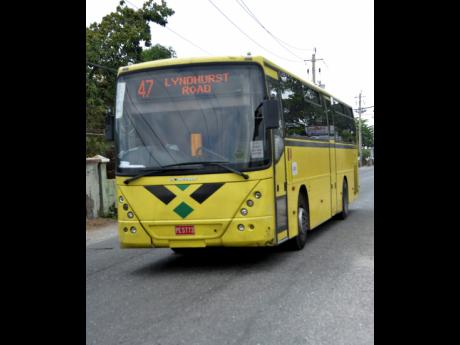Big bucks on buses - JUTC defends $100 million IT spend annually
Days after Transport Minister Mike Henry ordered an immediate management audit of the Jamaica Urban Transit Company (JUTC), The Sunday Gleaner has confirmed that the state-run bus company is spending more than $100 million annually to maintain the information technology (IT) infrastructure on its buses.
But the leadership of the JUTC is arguing that the money is being well spent and reflects a small charge for systems which came with the buses when they were bought from Belgian firm VDL.
The JUTC uses an electronic fare collection system (EFCS) and an automatic vehicle location/messaging (AVL/M) system on its buses.
The EFCS used by the company is developed by Mikroelektronika out of the Czech Republic with support provided by one of its partners, EC-IS, out of Belgium.
With questions being raised about the level of expenditure, former JUTC chairman, Garnett Roper, told The Sunday Gleaner that while the deal was not necessarily the ideal one, it was what he and his team inherited and had to work with.
"Before our time, the decisions were not necessarily made on the basis that you think they ought to be made. So when we purchased a bus from VDL, it came with its technology. So when we started out, we started with a given that this is what we inherited, this is the technical assistance and the software is their intellectual property," said Roper, who was chairman of JUTC from 2012 to March 2016.
COMMERCIAL EXPERIENCE
"The system that we got, if we were buying off the shelf, we wouldn't buy that, but that's what we got. So I do not think that we got the ideal one, but the people before us did not have commercial experience.
"For example, we paid a credit insurance of 10 per cent which we had managed to negotiate down to seven and a half per cent. But what we are locked into is very expensive; it's €700,000 per year for the service maintenance of the system," added Roper.
But information technology manager at the JUTC, Brian Tulloch, told The Sunday Gleaner that the support contract from EC-IS for the EFCS is at a value of €66 per bus, per month. The bus company is currently being charged for 570 buses which equates to €451,440 per annum.
"Put another way, €66 per bus, per month is approximately J$9,214.52 per bus, per month," said Tulloch.
"The JUTC averages 26 service days per month. On this basis, support per bus per day is approximately J$400, which is the fare from four regular adult customers."
As part of the agreement, EC-IS provides a service technician stationed at the JUTC to perform warranty, out-of-warranty and post-warranty repairs. The agreement is also said to include 24-hour access to EC-IS's help desk, complete software maintenance, preventive maintenance, system consultancy and training.
EC-IS is also responsible for the AVL/M system valued at €U37.50 per bus, per month. The JUTC is currently being charged for 500 buses, which equates to an additional €255,000 per annum,"
The AVL/M system used by the JUTC includes an onboard unit which is the hardware device installed on each bus to facilitate the tracking of the buses, plus controlled messaging between the bus operator and a central dispatch office.
According to Tulloch, the AVL/M system cost "€37.50 per bus, per month, which is approximately J$5,235.52 per bus, per month. On this basis, support per bus per day is approximately J$200, which is the fare from two regular adult customers."
EC-IS support for the AVL/M system is said to cover a number of things including refurbishing on the onboard unit, hosting and maintenance of all application server systems, weekly system audits and geo-fencing.
Roper, however, pointed that installing the geo-fencing technology, which generates an email each time a bus comes off route or stops for longer than scheduled, has been met with serious resistance from some drivers.
"It took us the better part of four years and we only got 200 up, because internally the people in the system can't afford that level of monitoring," Roper said. "Drivers would take out the fuse, so the cameras wouldn't work, because they refuse to be monitored."
Henry ordered a management audit shortly after being named transport minister following the Jamaica Labour Party's victory at the polls.
According to Henry, the bus company is in urgent need of government support and the objective of the audit is to identify critical operational issues impacting its efficiency.
He said the issues plaguing the bus company are many and varied and include: replacement of an ageing fleet of buses; credit arrangements for fuel and spare parts; additional equipment to support the fare collection system; and a refurbishing programme to enhance fleet output.



